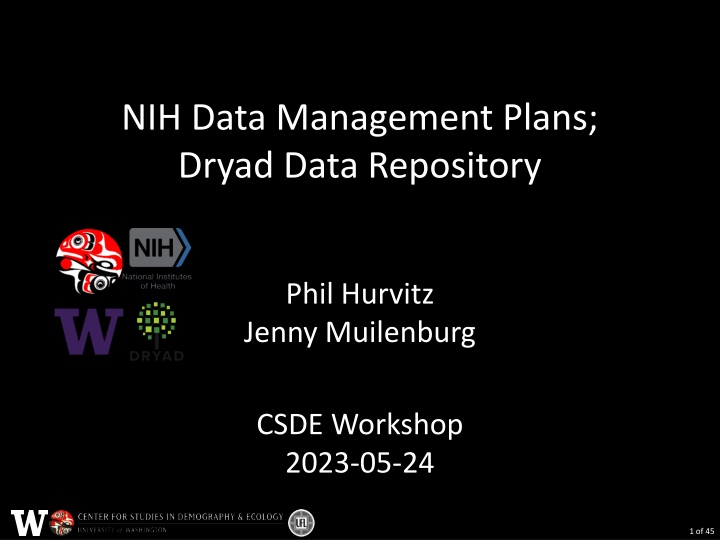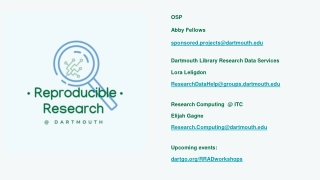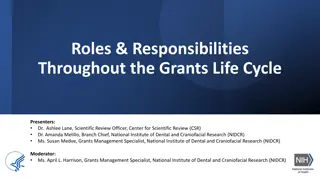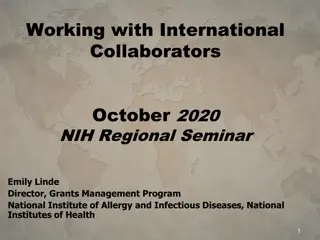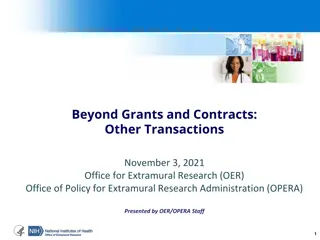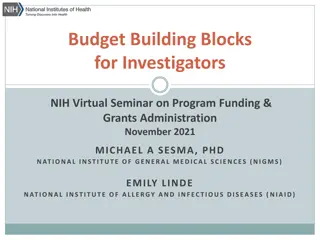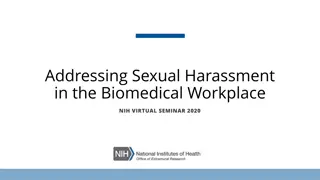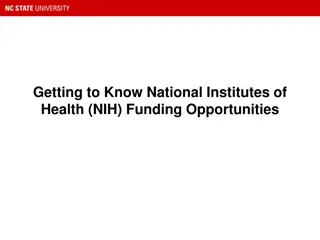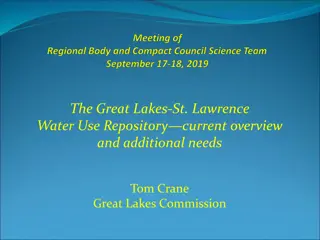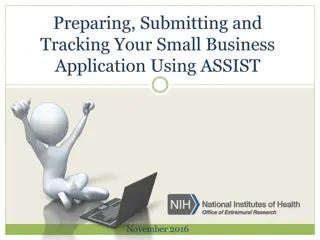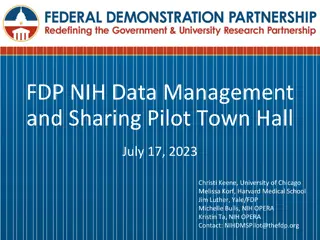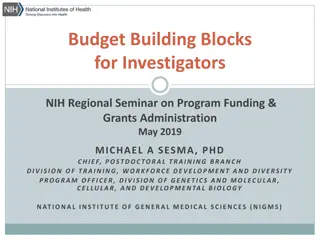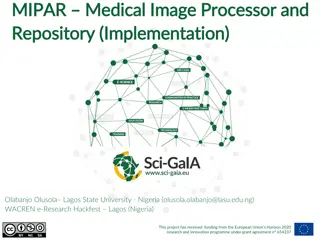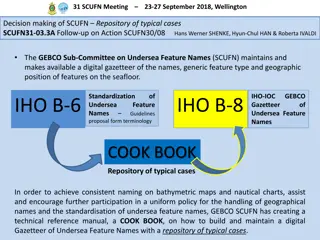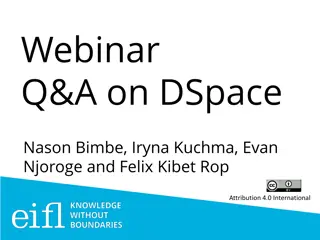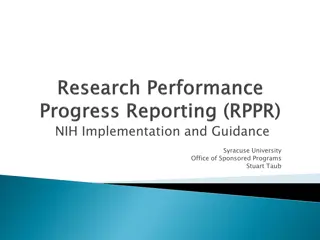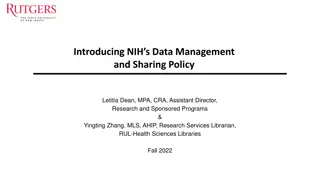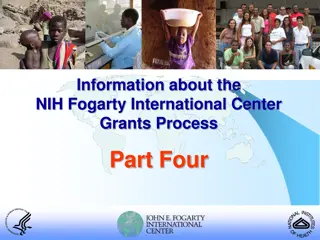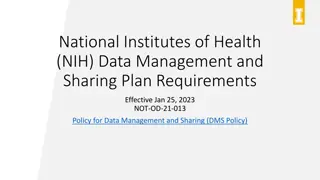NIH Data Management Plans and Dryad Data Repository Overview
An overview of the new NIH policy on Data Management and Sharing (DMS) Plans, highlighting the key requirements effective from January 25, 2023. Researchers' responsibilities, proposals for funding, long-term storage options including Dryad and QDR at UW are discussed. New NIH requirements mandate inclusion of DMS section in all research funding proposals, emphasizing the importance of data sharing. The reason behind this requirement is to maximize the value of research data for public benefit. Explore the significance and implications of these changes in how research data is managed and shared.
Download Presentation

Please find below an Image/Link to download the presentation.
The content on the website is provided AS IS for your information and personal use only. It may not be sold, licensed, or shared on other websites without obtaining consent from the author.If you encounter any issues during the download, it is possible that the publisher has removed the file from their server.
You are allowed to download the files provided on this website for personal or commercial use, subject to the condition that they are used lawfully. All files are the property of their respective owners.
The content on the website is provided AS IS for your information and personal use only. It may not be sold, licensed, or shared on other websites without obtaining consent from the author.
E N D
Presentation Transcript
NIH Data Management Plans; Dryad Data Repository Phil Hurvitz Jenny Muilenburg CSDE Workshop 2023-05-24 1 of 45
NIH Data Management Plans Phil Hurvitz Research Scientist Center for Studies in Demography and Ecology University of Washington CSDE Workshop 2023-05-24 2 of 45
Overview What is this workshop about? New NIH requirements for Data Management and Sharing (DMS) Plans: effective Jan 25, 2023 Your responsibilities as a researcher Proposals for funding During performance period After performance period is complete Other online resources Options for long-term storage and dissemination of research data at UW (Dryad, QDR) 3 of 45
What is this workshop? An overview of the new NIH policy on Data Management and Sharing (DMS) Plans. Not a complete treatment of the topic Highlights only; see Other Resources, FAQ, etc. Does not cover Genomic Data Sharing; see specific NIH materials Introduction to Dryad Data Repository for long- term storage of shareable research data 4 of 45
New NIH requirement Effective Jan 25, 2023 (i.e., now effective for all new research proposals) All proposals for research funding must include a section on Data Management and Sharing Proposals with no DMS Plan will not be accepted/reviewed Recommended DMS Plan to be no more than 2 pages DMS Plans are NOT visible to peer reviewers unless the FOA has a data sharing focus DMS Plans are therefore not scored on pink sheets 5 of 45
New NIH requirement Why is this being required? Consistent with both the NIH mission to improve public health through research and its longstanding legislative mandate to make available to the public the results of the research activities that it supports and conducts the NIH believes that the full value of GWAS to the public can be realized only if the genotype and phenotype datasets are made available as rapidly as possible to a wide range of scientific investigators. https://grants.nih.gov/grants/guide/notice-files/NOT-OD-07-013.html 6 of 45
New NIH requirement Why is this being required? Alias: how to make peace with these new requirements May be interpreted as yet another hoop to jump through or yet another administrative requirement Best thought of as a way to increase the impact of NIH-funded research Increases the shorter-term burden on individual researchers, but in the long run benefits all researchers and society in general 7 of 45
New NIH requirement What needs to be shared? Recorded factual material of sufficient quality to validate and replicate research findings, regardless of whether the data are used to support scholarly publications What not to share Lab notebooks Preliminary analyses Peer reviews Physical objects 8 of 45
New NIH requirement What may limit data sharing? Ethical, legal, and technical considerations, e.g., Informed consent may not permit or may limit scope of sharing or use Explicit federal, state, local, or Tribal law, regulation, or policy may prohibit disclosure What is not justifiable for limiting sharing? E.g., Dataset is too small Researchers anticipate data will not be widely used Data are not thought to have a suitable repository 9 of 45
New NIH requirement Applies to all research generating scientific data, including: Research Projects Some Career Development Awards (K series) Small Business SBIR/STTR Research Centers 10 of 45
New NIH requirement Does not apply to research and other activities that do not generate scientific data, including: Training (T series) Fellowships (F series) Construction (C06) Conference Grants (R13) Resources (G series) Research-Related Infrastructure Programs (e.g., S06, S10) 11 of 45
Your responsibilities as a researcher Proposals for funding During performance period After performance period is complete 12 of 45
Your responsibilities as a researcher: proposals Proposals for funding: Data Management and Storage (DMS) Plan must be included in your proposal Budgeting 13 of 45
Your responsibilities as a researcher: proposals/DMS Applications require a complete and acceptable DMS Plan Recommended to be no more than 2 pages May be longer than 2 pages if awards support a variety of activities or generate a lot of data sets 14 of 45
Your responsibilities as a researcher: proposals/DMS Example template PII? PHI? 15 of 45
Your responsibilities as a researcher: proposals/DMS Example text from NIH: 16 of 45
Your responsibilities as a researcher: proposals/DMS Format/templates are available Human clinical and/or MRI data (NIMH) Human genomic data (NIMH & NHGRI) Human & non-human genomic data (NIMH) Secondary data analysis (NIMH) Human clinical and genomics data (NICHD) Human survey data (NICHD) Model organism (Zebrafish) data (NICHD) Technology development (NHGRI) 17 of 45
Your responsibilities as a researcher: proposals/DMS Sample DMS templates: https://bit.ly/3Wrqtsh 18 of 45
Your responsibilities as a researcher: proposals/budget Your budget should cover costs related to DMS Plans You cannot request funds for DMS activities to be spent beyond the award end date expenditures must be incurred during the performance period You cannot fund future data storage costs on an expired budget! Be aware of allowable and unallowable costs 19 of 45
Your responsibilities as a researcher: proposals/budget Allowable costs Curating data/developing supporting documentation Preserving/sharing data through repositories Local data management considerations Unallowable costs Infrastructure costs typically included in indirect costs Costs associated with the routine conduct of research (e.g., costs of gaining access to research data) 20 of 45
Your responsibilities as a researcher: proposals/budget R&R Budget Form Data Management and Sharing Costs PHS 398 Modular Budget Form 21 of 45
Your responsibilities as a researcher: proposals/budget Although the actual DMS Plan is not visible to peer reviewers, include 1/2 page within your budget justification, which is peer reviewed Reviewers may comment on DMS costs based on budget justification 22 of 45
Your responsibilities as a researcher: performance period Approved DMS Plan becomes a term and condition of award Data sharing must be implemented no later than (whichever comes first): First publication End of award period DMS Plans may be updated throughout award lifecycle if revisions are necessary Changes must be approved by Officer DMS Plan is part of RPPR DMS Plan is reviewed annually 23 of 45
Your responsibilities as a researcher: post-performance Little documentation exist so far Recipients generally must retain financial and programmatic records, supporting documents, statistical records, and all other records that are required by the terms of a grant, or may reasonably be considered pertinent to a grant, for a period of 3 years from the date the annual FFR is submitted. For awards issued under the SNAP authorities, the three-year retention period is calculated from the date the FFR is submitted for the entire competitive segment. https://grants.nih.gov/grants/post-award-monitoring-and-reporting.htm Optimally a data and code repository will remain in perpetuity Repositories, DOI, etc. 24 of 45
Other (online) resources FAQ: https://sharing.nih.gov/faqs#/data- management-and-sharing-policy.htm Final NIH Policy for Data Management and Sharing https://grants.nih.gov/grants/guide/notice- files/NOT-OD-21-013.html 25 of 45
Policy and Supplemental Information NOT-OD-21-013 Final NIH Policy for Data Management and Sharing NOT-OD-21-014 Supplemental Information to the NIH Policy for Data Management and Sharing: Elements of an NIH Data Management and Sharing Plan NOT-OD-21-015 Supplemental Information to the NIH Policy for Data Management and Sharing: Allowable Costs for Data Management and Sharing NOT-OD-21-016 Supplemental Information to the NIH Policy for Data Management and Sharing: Selecting a Repository for Data Resulting from NIH-Supported Research 26 of 45 26
Additional slides from NIH 27 of 45
Relevant Notices NOT-OD-22-189 Implementation Details for the NIH Data Management and Sharing Policy (August 5) NOT-OD-22-195 New NIH "FORMS-H" Grant Application Forms and Instructions Coming for Due Dates on or after January 25, 2023 (August 8) NOT-OD-22-198 Implementation Changes for Genomic Data Sharing Plans Included with Applications Due on or after January 25, 2023 (August 31) NOT-OD-22-213 Supplemental Information to the NIH Policy for Data Management and Sharing: Protecting Privacy When Sharing Human Research Participant Data (September 21) NOT-OD-22-214 Supplemental Information to the NIH Policy for Data Management and Sharing: Responsible Management and Sharing of American Indian/Alaska Native Participant Data (September 21) 28 of 45
Informed Consent and DMS Policy Policy encourages researchers and institutions to establish robust consent processes, but: Does not establish additional consent expectations Does not require consent be obtained any particular way (e.g., broad consent) Policy recognizes limitations on data sharing based on the informed consent process Informed Consent Resources: Points to consider Sample language for future use and/or data sharing Informed Consent Resource 29 of 45
Supplemental Information for Protecting Privacy When Sharing Human Research Participant Data Provides a basic framework for considering how to protect privacy when sharing data from human participants Not intended as a guide for regulatory compliance Broadly applicable to different research contexts Establishes shared principles, provides best practices, and offers considerations for determining whether to control access to data NOT-OD-22-213 30 of 45
Supplemental Information: Responsible Management and Sharing of American Indian/ Alaska Native Participant Data Information to assist in developing appropriate DMS Plans Best Practices for Responsible Management and Sharing of AI/AN Participant Data Emphasizes: Respect for Tribal Sovereignty Partnerships and mutual agreements Building trust Developed through Tribal Consultation and stakeholder engagement beginning in 2019 NOT-OD-22-214 31 of 45
Research Data Management and Dryad CSDE Jenny Muilenburg Research Data Services Librarian May 24, 2023 32 of 46 32 of 45
UW Data Repositories Introduction to Dryad & QDR Demo & support Q&A 33 of 45
Whats included? 34 of 45
Where to Share National repositories like the National Center for Biotechnology Information or one from the NIH list of approved sharing repositories Community-sponsored websites like the Neuroscience Information Framework An generalist repository, such as UW's Dryad QDR 36 of 45
NIH DMSP Resources A checklist for researchers using the DMSP DMPTool. Provides text-based templates, generates a 2-page text document. Membership with data repository Dryad, free to UW researchers to use to openly share data, and one of NIH s recommended generalist repositories. Membership with QDR for qualitative data 37 of 45
Dryad 38 of 45
Dryad Data must not have any PII/sensitive data Data must be licensed with a CC0 1.0 license (basically in the public domain) Login with ORCID, thereafter UW netid Demo Example dataset 40 of 45
Qualitative Data Repository (QDR) Qualitative Data Repository For qualitative data that requires more in- depth curation For data that requires access controls 41 of 45
QDR access controls 42 of 45
Open Science/Open Research UW s OA policy Open Access @ UW How do I make my articles open? Related: UW Reproducibility and Open Research group 43 of 45
NIH DMSP Resources UW NIH resource page Presentation at November 2022 MRAM meeting o 05 Certificates of Confidentiality and Data Sharing.MRAM_.11.10.22.pptx o 04 NIH DMS Policy and Forms H.MRAM_.11.10.22.pptx 44 of 45
Q & A Jenny Muilenburg jmuil@uw.edu Phil Hurvitz, phurvitz@uw.edu 45 of 45
